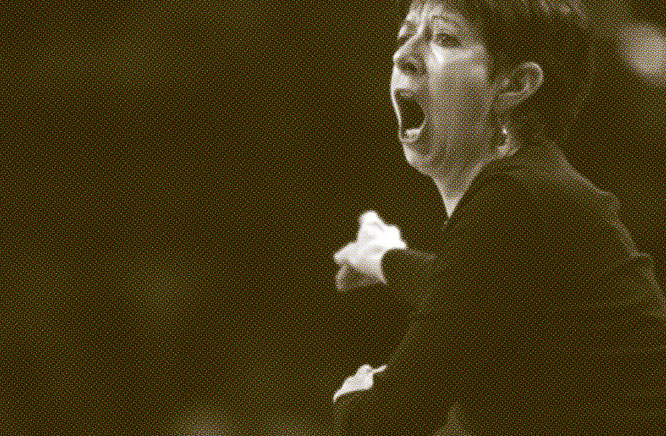
“Men run the world. Men have the power. Men make the decisions. It’s always the man that is the stronger one,” the coach of the defending national championship team told reporters last week. “Girls are socialized to know when they come out, gender rules are already set.”
If the University of Notre Dame women’s basketball team wins tonight’s NCAA Women’s Final Four championship game, it certainly won’t prove head coach Muffet McGraw’s point.
Neither did Friday night’s exciting contest between Notre Dame’s astounding women basketball players and the magnificent women from the University of Connecticut. I, a man, decided to watch. After all, some of my best friends are women … and it is basketball.
The rival U‑Conn Huskies were coached by Geno Auriemma, a man, but somewhat inexplicably, though he ‘runs the world’ and has ‘all the power,’ his team did not prevail.
Granted, McGraw, the very successful female — and also white and cisgendered — Notre Dame coach, wasn’t talking about Auriemma, necessarily, but responding to questions regarding her stated policy of not hiring men as assistants, detailed in a ThinkProgress article, headlined, “Muffet McGraw is done hiring men.”
Men of any race or sexual orientation. In short, male Homo sapiens need not apply.
“I kind of liked the idea that a woman was in charge,” McGraw acknowledged to ThinkProgress about ‘the optics’ of having a male assistant coach on her staff years ago. “My team could see that like, I’m the boss. Yeah, he’s working for me.”
But, apparently, the thrill is gone.
“I’m getting tired of the novelty of the first female governor of this state, the first female African American mayor of this city,” McGraw offered. “When is it going to become the norm, instead of the exception?”
She complained that, “We don’t have enough female role models. We don’t have enough visible women leaders. We don’t have enough women in power.… Wouldn’t it be great if we could teach [young women] to watch how women lead?
McGraw is right, of course — to an extent. We want people to see themselves succeeding, and that visualization may be easiest when there is a role model who looks like you — racially, gender-wise, etc. Let us remove barriers to participation for women, for everyone.
On the other hand, don’t get carried away with ‘optics.’ One’s role models are not required to be of the same sex or race. My mother was certainly an important role model for me and, likewise, my father for my sisters. People are unique individuals and cannot fully be delineated by gender, race, sexual orientation. Besides, there are today so many successful people of every race, creed and color — and gender — that if you can’t find a role model in your make and model, you are not looking hard enough.
“Women can be empowered by a lot of people, men included,” remarked Chris Dailey, the female top assistant coach at U‑Conn. “Opportunity for women is important, and it’s being brought to the forefront, which is amazing. But I do think you want good people in the game without excluding anyone.”
Exclusion is the problem. I cannot imagine a male college coach announcing he categorically would not hire a woman as an assistant. He would be sued. He would be hounded. He would be fired.
He would be wrong.
Not to dismiss McGraw’s complaints, however. Female coaches have lost ground under Title IX, which starting in 1972 required equal access to college athletics for women. “[A]bout 59 percent of women’s college basketball teams were coached by women last year,” The New York Times noted, “compared with 79 percent in 1977.”
Title IX provides equal access to collegiate athletes, not paid coaches.
“When you look at men’s basketball and 99 percent of the jobs go to men,” McGraw argued, exaggerating, “why shouldn’t 99 percent of the jobs in women’s basketball go to women?”
“People hire people who look like them,” she concluded, “and that’s the problem.”
Hmmm, Coach McGraw has identified one problem … but then decided to double-down on it? She is, in fact, pledging to hire only people who look like her — at least in terms of sex.
The views of other coaches seem to run the gamut. Some prefer to hire women, others are equally open to employing both men and women. Since 1985, Stanford University Head Coach Tara VanDerveer has not employed a single man as an assistant. She thinks her team “would benefit from having both men and women” coaches, but “feel[s] a responsibility to help develop women in women’s basketball.”
Coach Auriemma,McGraw’s arch-rival, looking “at it from a different standpoint,” explained that the University of Oregon hired a male coach, the best coach they could find, and that man helped the Ducks make it to the Women’s Final Four.
“So they weren’t trying to advance women’s basketball or women by hiring Kelly? That was a bad move?” he inquired. “They should have just found the best available woman?”
There is a weird sexism in McGraw’s obsession. And a skewed view of social reality, too: Most men don’t “run the world” or “have the power.” Only a very few do. Same as most women, most men want a fair shot, the freedom to pursue their own happiness, and to be judged as individuals, not merely representatives of their gender or race or sexual orientation.
Let’s get on the same team.
Paul Jacob, April 7, 2019
